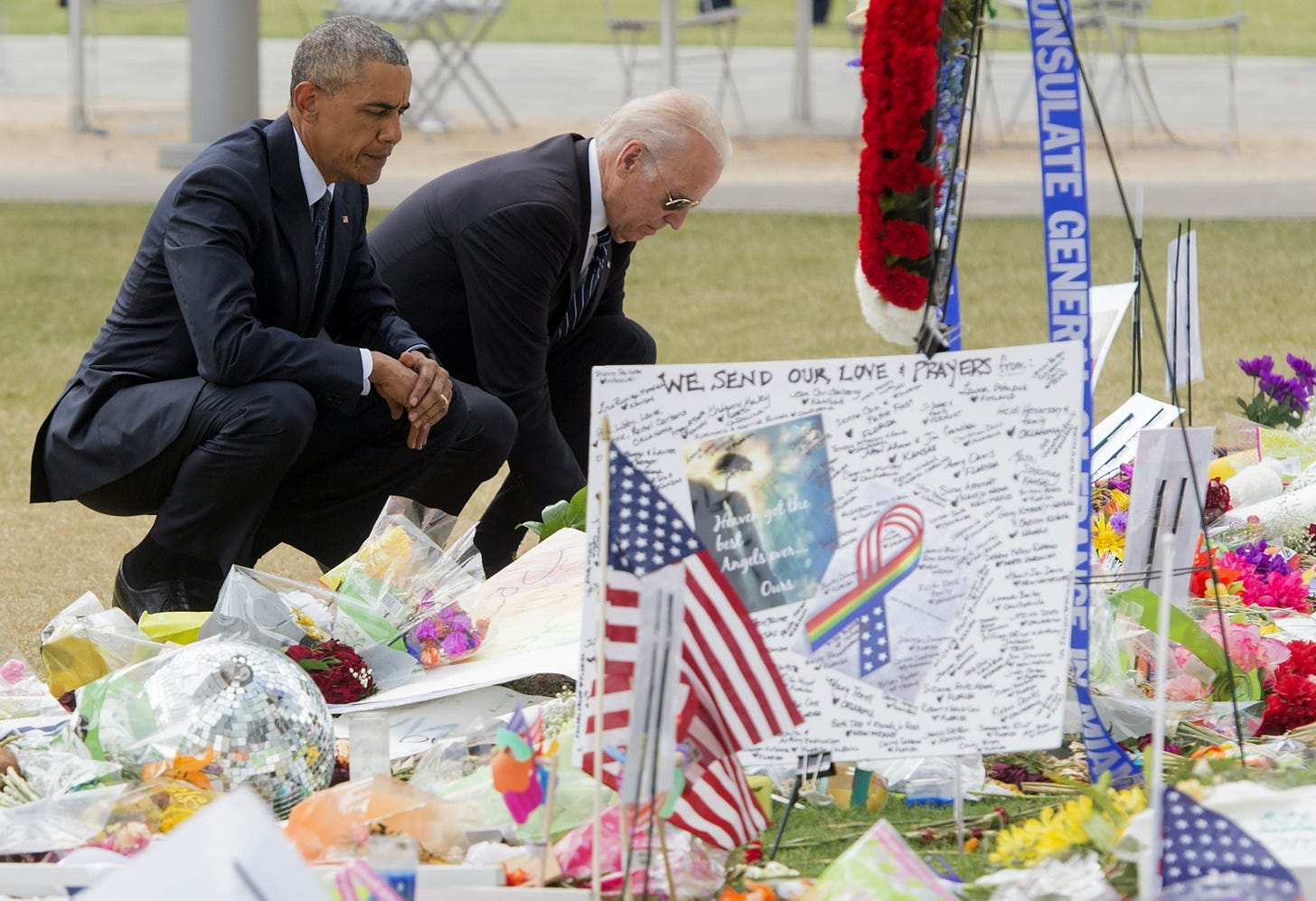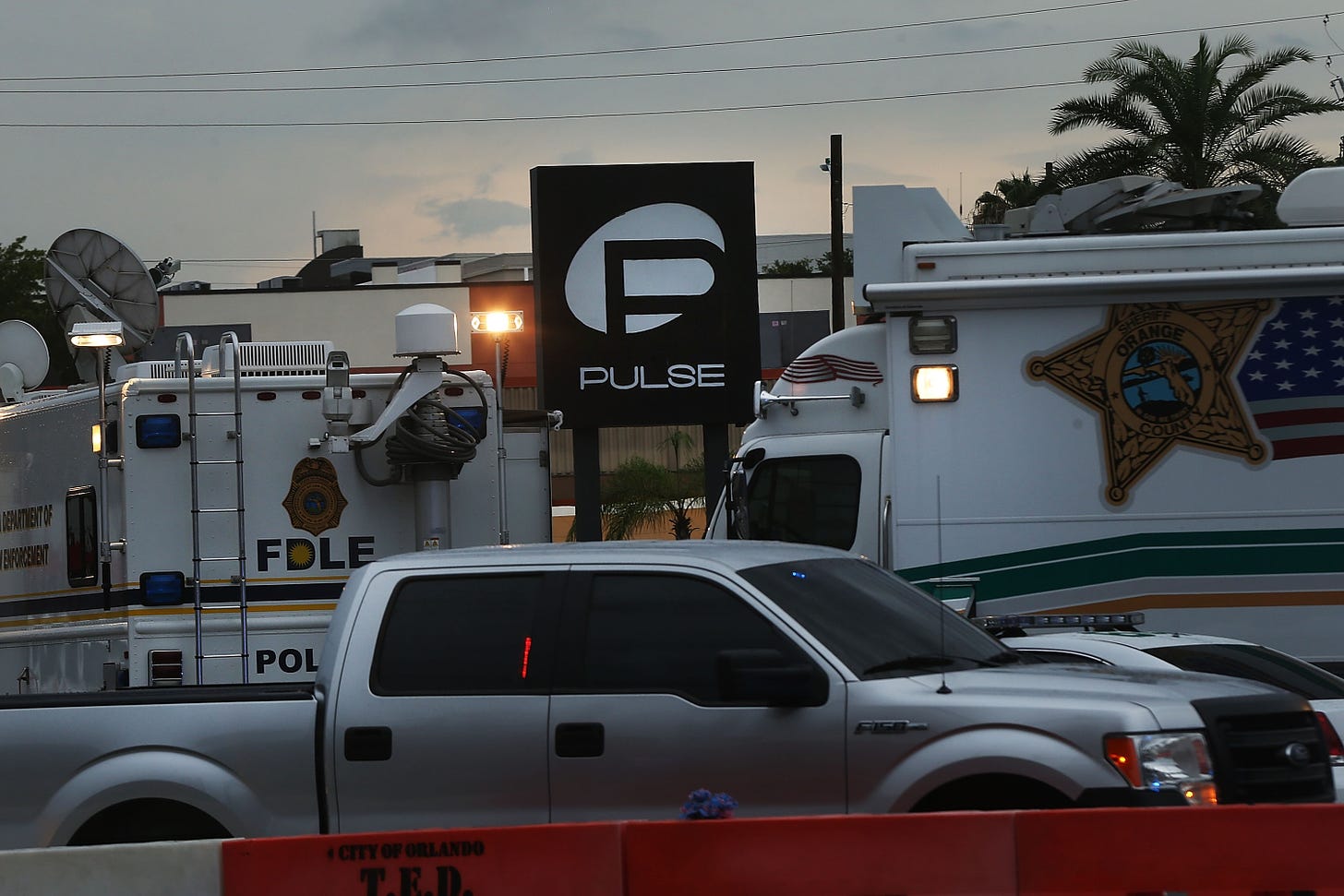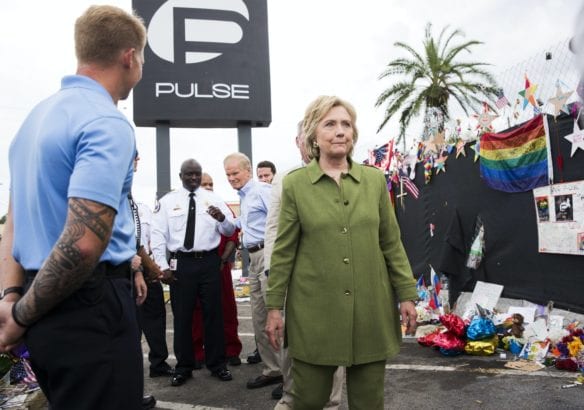Politicians and activists should stop ratifying the fiction that the shooter was motivated by anti-LGBT hatred. It dishonors the victims, purveys anti-Muslim misinformation, and obscures the real motive. Mateen, like so many others who committed similar acts of violence, was motivated by rage over President Obama’s bombing campaigns in Syria, Iraq, and Afghanistan that killed multitudes of men, women, and children. He chose PULSE at random without even knowing it was a gay club — yet this media-consecrated lie continues to fester.
By Glenn Greenwald, reposted from Substack
On the fifth anniversary of the PULSE nightclub massacre in Orlando, numerous senators, politicians, and activist groups commemorated that tragic event by propagating an absolute falsehood: namely, that the shooter, Omar Mateen, was motivated by anti-LGBT animus. The evidence is definitive and conclusive that this is false — Mateen, like so many others who committed similar acts of violence, was motivated by rage over President Obama’s bombing campaigns in Syria, Iraq, and Afghanistan, and chose PULSE at random without even knowing it was a gay club — yet this media-consecrated lie continues to fester.
On Saturday, Sen. Cory Booker (D-NJ) falsely described the massacre as an “unspeakable act of hate toward the LGBTQ+ community.” Sen. Tammy Duckworth (D-IL) went even further, claiming “the LGBTQ+ community was targeted and killed—all because they dared to live their lives.” Her fellow Illinois Democrat, Sen. Dick Durbin, claimed forty-nine lives were lost due to “anti-LGBTQ hate” (he forgot the +). These false claims were compiled by the gay socialist activist Matt Thomas, who correctly objected: “the shooter literally picked PULSE at random from Google after security was too tight at the mall he went to first,” adding that while LGBT groups “are hopeless of course,” too much money and power is at stake for them to give up this self-serving fiction. But he asked, “Shouldn’t the bar be a little higher for senators?”
In the immediate aftermath of that horrific crime, it may have been reasonable for the public to speculate that Mateen, given his professed support for ISIS, chose PULSE because it was a gay club. That belief also neatly played into a liberal political agenda of highlighting anti-LGBT hate crimes, and also comported with the dual stereotypes of the gay-hating Muslim and the closeted gay man who harbors self-hatred that ends up directed at other gay people. This storyline was instantly consecrated when politicians and LGBT groups quickly seized on this claim and ratified it as unquestionably true.
Rather than acknowledging that it was anger over his relentless bombing raids in the Muslim world, President Obama immediately declared that anti-LGBT hatred was the real cause. “This was an attack on the LGBT community,” the president said, adding: “And hatred towards people because of sexual orientation, regardless of where it comes from, is a betrayal of what’s best in us.” Chad Griffin, then-head of the largest LGBT advocacy group, Human Rights Campaign, claimed: “the maniac who did this was somehow conditioned to believe that LGBT people deserve to be massacred, that they are ‘less than’ in this society.”
Then-candidate Hillary Clinton, as part of her campaign, made a pilgrimage to Orlando and seized on the attack. In addition to its constituting anti-American terrorism, the Democratic nominee proclaimed the massacre “was also an act of hate,” adding that “the gunman attacked an LGBT nightclub during Pride Month.” She vowed: “We will keep fighting for your right to live freely, openly, and without fear. Hate has absolutely no place in America.” Speaking with Clinton in Orlando, Attorney General Loretta Lynch said that it is “a cruel irony that a community defined almost exclusively by whom they love [LGBT people] is so often a target of hate.” Then-candidate Donald Trump also endorsed this view: “A radical Islamic terrorist targeted the nightclub, not only because he wanted to kill Americans, but in order to execute gay and lesbian citizens, because of their sexual orientation.”
Liberal propagandists who pose as journalists treated this storyline as definitively proven. The massacre was “undeniably a homophobic hate crime,” Jeet Heer wrote in The New Republic. “Let’s say it plainly: This was a mass slaying aimed at LGBT people,” Tim Teeman wrote in The Daily Beast. In USA Today, James S. Robbins speculated that Mateen was likely “trying to reconcile his inner feelings with his strongly homophobic Muslim culture.” In the days following the killing spree, one writer in USA Today, Steph Solis, even accused those of questioning this narrative of propagating bigotry and exhibiting cruel indifference to gay suffering: “Those who insist the shooting was solely an Islamic terror attack try to erase the LGBT community from the narrative, causing only more pain by invalidating their experiences in this ordeal.”

But journalism is supposed to function on evidence, not speculation, and there never was any evidence that supported the storyline that he was driven by hatred for LGBTs. The evidence that was available suggested the opposite.
On June 12, 2016, Mateen spent just over three hours in PULSE from the time he began slaughtering innocent people at roughly 2:00 a.m. until he was killed by a SWAT team at roughly 5:00 a.m. During that time, he repeatedly spoke to his captives about his motive, did the same with the police with whom he was negotiating, and discussed his cause with local media which he had called from inside the club. Mateen was remarkably consistent in what he said about his motivation. Over and over, he emphasized that his attack at PULSE was in retaliation for U.S. bombing campaigns in Iraq, Syria, and Afghanistan. In his first call with 911 while inside PULSE, this is what he said about why he was killing people:
Because you have to tell America to stop bombing Syria and Iraq. They are killing a lot of innocent people. What am I to do here when my people are getting killed over there. … You need to stop the U.S. airstrikes. They need to stop the U.S. airstrikes, OK? . … This went down, a lot of innocent women and children are getting killed in Syria and Iraq and Afghanistan, OK? … The airstrikes need to stop and stop collaborating with Russia. OK?
In the hours he spent surrounded by the gay people he was murdering, he never once uttered a homophobic syllable, instead always emphasizing his geo-political motive. Not a single survivor reported him saying anything derogatory about LGBTs or even anything that suggested he knew he was in a gay club. All said he spoke extensively about his vengeance on behalf of ISIS against the U.S. bombing of innocent Muslims.
Mateen’s postings on Facebook leading up to his attack all reflected the same motive. They were filled with rage and vows of retaliation against the U.S. bombing. Not a single post contained any references to LGBTs let alone anger or violence toward them. “You kill innocent women and children by doing U.S. airstrikes,” Mateen wrote on Facebook in one of his last posts before attacking PULSE, adding: “Now taste the Islamic state vengeance.”

It was of course nonetheless possible that he secretly harbored hatred for LGBTs and hid his real motive, but that never made sense: the whole point of terrorism is to publicize, not conceal, the grievances driving the violence. And again, good journalism requires evidence before ratifying claims. There never was any to support the story that Mateen’s attack was driven by anti-LGBT hatred, and all the available evidence early on negated that suspicion and pointed to a radically different motive. But the media frenzy ended up, by design or otherwise, obscuring Mateen’s anger over Obama’s bombing campaigns as his motive in favor of promoting this as an anti-LGBT hate crime.
As the FBI investigation into Mateen proceeded, all the early media gossip — that Mateen was a closeted gay man who had searched for male sexual partners and had even previously visited PULSE — was debunked. The month after the attack, The Washington Post reported that “The FBI has found no evidence so far that Omar Mateen chose the popular establishment because of its gay clientele,” and quoted a federal investigator as saying: “While there can be no denying the significant impact on the gay community, the investigation hasn’t revealed that he targeted PULSE because it was a gay club.” The New York Times quickly noted that no evidence could be found to support the speculation that Mateen was gay:
F.B.I. investigators, who have conducted more than 500 interviews in the case, are continuing to contact men who claim to have had sexual relations with Mr. Mateen or think they saw him at gay bars. But so far, they have not found any independent corroboration — through his web searches, emails or other electronic data — to establish that he was, in fact, gay, officials said.
The following year, the local paper that most extensively covered the PULSE massacre, The Orlando Sentinel, acknowledged that “there’s still no evidence that the PULSE killer intended to target gay people.”
As the investigation proceeded, this anti-LGBT hate crime narrative became more and more unlikely. But the question of Mateen’s motives was settled once and for all — or at least it should have been — during the unsuccessful attempt by the Justice Department to prosecute Mateen’s wife, Noor Salman, on numerous felony charges alleging her complicity in her husband’s attack. That trial — quite justifiably — ended in a full acquittal for Salman, but evidence emerged during it that conclusively disproved the widely held view that Mateen chose PULSE because he wanted to kill gay people.
Along with my then-colleague Murtaza Hussain, I extensively reported on the Salman trial and compiled all the evidence that emerged during it that proved anti-LGBT hatred was not part of Mateen’s motive. But it was not just us: virtually every journalist who covered that trial, including several who began believing or at least suspecting that this was an anti-gay hate crime, definitively concluded that this was false. Reporter Melissa Jeltsen covered that trial for The Huffington Post and — writing under the headline “Everyone Got The Pulse Massacre Story Completely Wrong” — explained:
Almost overnight, a narrative emerged that until now has been impossible to dislodge: Mateen planned and executed an attack on PULSE because he hated gay people. . . . Salman’s trial cast doubt on everything we thought we knew about Mateen. There was no evidence he was a closeted gay man, no evidence that he was ever on Grindr. He looked at porn involving older women, but investigators who scoured Mateen’s electronic devices couldn’t find any internet history related to homosexuality. (There were daily, obsessive searches about ISIS, however.) Mateen had extramarital affairs with women, two of whom testified during the trial about his duplicitous ways.
Mateen may very well have been homophobic. He supported ISIS, after all, and his father, an FBI informant currently under criminal investigation, told NBC that his son once got angry after seeing two men kissing. But whatever his personal feelings, the overwhelming evidence suggests his attack was not motivated by it.
Even the gay reporter for NBC News who covers the LGBT community, Tim Fitzsimons, tried to make clear that the commonly held view of the PULSE attack as an anti-LGBT hate crime was false. “The attack on the nightclub has long been seen as a hate crime directed at the LGBTQ community,” explained the headline under which he wrote, “but all evidence says the gunman chose it at random.”

What that conclusive evidence proved is that Mateen had spent days scoping out Disney locations but concluded they were too secured to attack. Search records from Mateen’s phone and computers showed him looking for “Orlando clubs,” but never “gay Orlando clubs.” That night, after cell tower records and security cameras, showed him scoping out several Disney venues, he used his phone to Google the search term “Orlando nightclubs” — not “gay clubs” — and chose PULSE because the popular nightclub was the first search term that appeared. Witnesses said that when he entered, he asked security guards: “where are the women?” As Jeltsen wrote: “As far as investigators could tell, Mateen had never been to PULSE before, whether as a patron or to case the nightclub.” None of Mateen’s phones or computers had any evidence he sought sex with men but contained ample evidence of his affairs with numerous women.
Whatever Mateen’s motives were, the horror and tragedy of the extinguishing of forty-nine innocent lives at PULSE on June 12, 2016, remains the same. But this enduring falsehood — which continues to deceive many well-meaning people through this very day, long past the point that it has been definitively debunked — is damaging for so many reasons. Lying about what happened dishonors Mateen’s victims. It harms the cause of LGBT equality, which does not need lies and fabrications to be a just movement. It obscures how often U.S. violence in the Muslim world causes “blowback” — to use the CIA’s term — by motivating others to bring violence to the U.S. as retaliation and deterrence for violence against innocent Muslims. And a major reason for the completely unjust prosecution of Noor Salman was to appease understandable demands within the Orlando LGBT community for someone to be punished, but mob justice rarely produces anything benevolent.No matter how noble the intent, journalism — and activism — become corrupted if it knowingly supports falsehoods. That the PULSE massacre was an act of anti-LGBT hatred is fiction. Unless you are a neocon, there is no such thing as a “noble lie.” It is way past time for politicians and activist groups to stop disseminating this one.
Glenn Greenwald is a journalist; co-founder, The Intercept; author, No Place to Hide and a forthcoming book on Brazil; animal fanatic & founder of HOPE Shelter.
RELATED READING:
- Hedges, Taibbi, Greenwald discuss anti-Trump censorship (reminiscent of Dorothy Thompson)
- Greenwald details Biden appointee Neera Tanden’s outrageous actions
- The Forward: Major Jewish Leader Spent $1M On Secret Group Pushing Anti-Muslim Campaign Ads
- How Israel partisans have worked to create fear and hatred of Muslims
- It’s even worse than llhan Omar said: The Israel lobby in full
- Killing Mosquitoes: The Gaza Massacres, Pro-Israel Media Bias, & the Weapon Of ‘Antisemitism’





